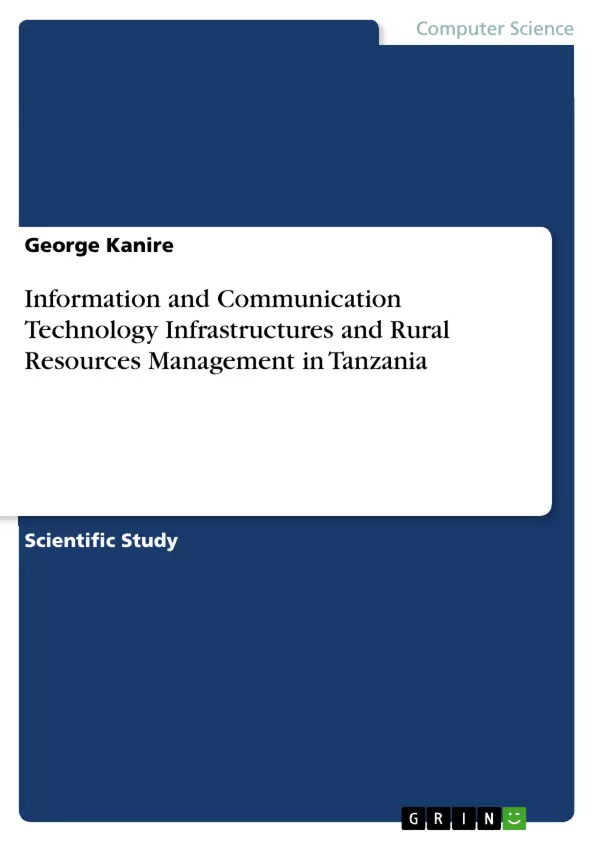Abstract
Information and Communication Technology as well as its use, have become a crucial strategic instrument on resource management and decision making. Therefore, it has called various individual attentions, especially in research and management. The study current study attempts to examine efforts deployed on ICT by stakeholders towards rural resource management. The discussion is mainly involved on major outcome of ICT strategies to improve the rural life. For instance the government efforts through ICT policy implementation, strategies, level of infrastructure developed and their impact on rural resource management. The finding shows that despite the critical measures taken against ICT infrastructures and human resource development. But, the government including the rural stakeholders is still facing challenges on full utilization of ICT in resources management. Hence, in order to improve ICT infrastructures and enjoy the proper use of ICT services on resources management. It needs multidimensional approach towards ICT functions and user involvement to arrest the poor practices and failures on the technology. Therefore, the study recommended the use of education and training to achieve sustainability of ICT performance. This is to maintain the quality information supply chain in order to reduce management costs/risks related to failure on data/ information access.
Keywords: ICT infrastructures, rural resources, challenges, ICT identifiable indicators
Inhaltsverzeichnis (Table of Contents)
- Introduction
- Objectives
- Research questions
- Methodology
- Results and Discussion
Zielsetzung und Themenschwerpunkte (Objectives and Key Themes)
This research aims to investigate the role of Information and Communication Technology (ICT) in rural resource management within Tanzania, specifically focusing on its impact on economic development and the challenges faced in its implementation.
- The impact of ICT infrastructure development on rural resource management
- The effectiveness of ICT strategies in improving social and rural economies
- The challenges and limitations of ICT implementation in rural Tanzania
- The importance of human resource development and training for successful ICT utilization
- The potential of ICT to bridge the knowledge gap between rural and urban communities
Zusammenfassung der Kapitel (Chapter Summaries)
The Introduction provides an overview of the study's focus on ICT as a tool for managing rural resources in Tanzania. It discusses the significance of ICT for economic development and highlights the challenges faced in rural areas, including limited connectivity, poor infrastructure, and high costs. The study emphasizes the need to bridge the gap between rural and urban communities in terms of ICT access and knowledge.
The Objectives section outlines the specific goals of the research. These objectives are focused on evaluating the current state of ICT infrastructure development in relation to resource management, assessing the impact of ICT strategies on the social and rural economy, and identifying the challenges and opportunities for ICT utilization in rural Tanzania.
The Research Questions section elaborates on the key questions the study aims to answer. These questions are directly related to the objectives and focus on exploring the development of ICT infrastructures, the effectiveness of ICT strategies, and the challenges related to resource management in rural Tanzania.
The Methodology section describes the research design and methods employed in the study. It explains the use of a descriptive survey design, combining quantitative and qualitative approaches to examine the role of ICT in rural resource management. The section also outlines the sampling techniques used, including multi-stage sampling and a structured questionnaire instrument.
The Results and Discussion section presents preliminary findings from a field survey in rural Tanzania. The findings are presented in a table format, highlighting key indicators such as data access, internet connectivity, female ICT users, effective ICT use, infrastructure development, and cost affordability.
Schlüsselwörter (Keywords)
This research focuses on the role of ICT in rural resource management in Tanzania, exploring key themes such as ICT infrastructure development, rural resource management, the challenges of ICT implementation, human resource development, and the potential of ICT to bridge the knowledge gap between rural and urban communities.
Frequently Asked Questions
What is the role of ICT in Tanzania's rural resource management?
ICT serves as a strategic instrument for resource management and decision-making, helping stakeholders monitor rural resources and improve social and economic life.
What are the main challenges for ICT in rural Tanzania?
Key challenges include poor infrastructure, high costs of connectivity, limited internet access, and a lack of trained human resources to utilize the technology effectively.
How can ICT performance be made sustainable?
Sustainability can be achieved through continuous education and training, as well as involving users in the design and implementation of technology functions.
What is the 'knowledge gap' mentioned in the study?
It refers to the disparity in information access and ICT skills between urban centers and rural communities, which hinders equitable economic development.
Why is human resource development crucial for ICT?
Infrastructure alone is insufficient; without people trained to maintain and use the systems, the risk of failure in data access and information supply chains remains high.
What are ICT identifiable indicators?
These are metrics like the percentage of female ICT users, internet connectivity rates, and cost affordability used to measure the impact of technology in rural areas.
- Arbeit zitieren
- Dr. George Kanire (Autor:in), 2012, Information and Communication Technology Infrastructures and Rural Resources Management in Tanzania, München, GRIN Verlag, https://www.grin.com/document/198342



